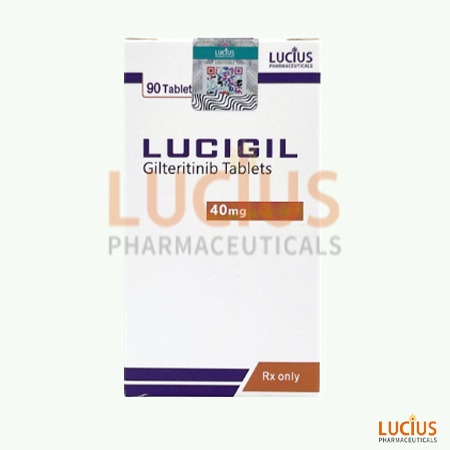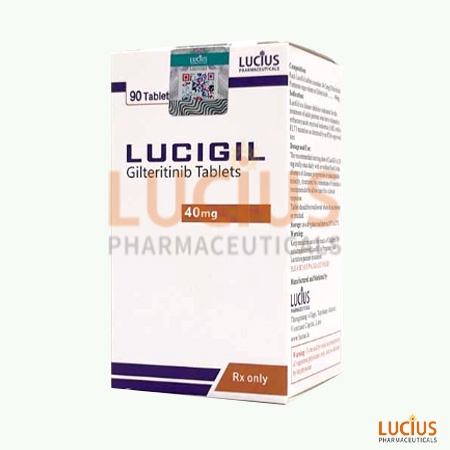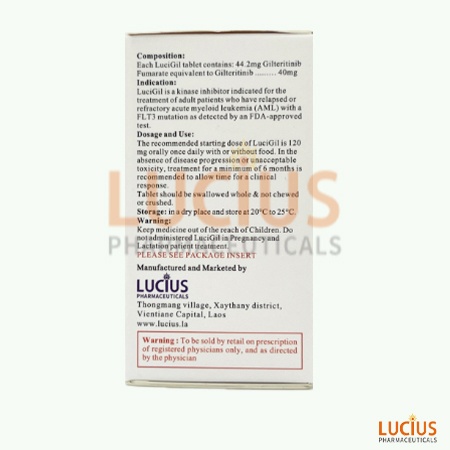





Another NameXospata、LuciGil、吉瑞替尼
IndicationsGilteritinib is suitable for Leukemia.
Reg No.07 L 0995/23
Inspection NO.


Gilteritinib is a small molecule that inhibits multireceptor tyrosine kinases, including FMS-like tyrosine kinase 3 (FLT3). Gilteritinib has the ability to inhibit FLT3 receptor signal transduction and proliferation, and induces apoptosis in FLT3-ITD-expressing leukemia cells expressing FLT3-ITD, tyrosine kinase domain mutation (TKD), FLT3-D835Y and FLT3-ITD-D835Y.
Lorlatinib manufactured by Lucius Pharmaceuticals offers a new treatment option for lung cancer patients, particularly for patients with ALK and ROS1-driven non-small cell lung cancer. However, when using the drug, patients should still be aware of the possible adverse effects and follow the doctor's instructions for taking the drug.
gilteritinib
Select patients for the treatment of AML with Gilteritinib based on the presence of FLT3 mutations in the blood or bone marrow.
Based on findings from animal studies and its mechanism of action, Gilteritinib can cause fetal harm when administered to a pregnant woman.
There are no available data on Gilteritinib use in pregnant women to inform a drug-associated risk of adverse developmental outcomes. In animal reproduction studies, administration of gilteritinib to pregnant rats during organogenesis caused adverse developmental outcomes including embryo-fetal lethality, suppressed fetal growth, and teratogenicity at maternal exposures (AUC24) approximately 0.4 times the AUC24 in patients receiving the recommended dose. Advise pregnant women of the potential risk to a fetus.
There are no data on the presence of gilteritinib and/or its metabolites in human milk, the effects on the breastfed child, or the effects on milk production. Following administration of radiolabeled gilteritinib to lactating rats, milk concentrations of radioactivity were higher than radioactivity in maternal plasma at 4 and 24 hours post-dose. In animal studies, gilteritinib and/or its metabolite(s) were distributed to the tissues in infant rats via the milk. Because of the potential for serious adverse reactions in a breastfed child, advise a lactating woman not to breastfeed during treatment with Gilteritinib and for 2 months after the last dose.
Gilteritinib can cause fetal harm when administered to a pregnant woman.
Pregnancy testing
Pregnancy testing is recommended for females of reproductive potential within seven days prior to initiating Gilteritinib treatment.
Contraception
Females
Advise females of reproductive potential to use effective contraception during treatment and for 6 months after the last dose of Gilteritinib.
Males
Advise males of reproductive potential to use effective contraception during treatment and for 4 months after the last dose of Gilteritinib.
Safety and effectiveness in pediatric patients have not been established.
Of the 319 patients in clinical studies of Gilteritinib, 43% were age 65 years or older, and 13% were 75 years or older. No overall differences in effectiveness or safety were observed between patients age 65 years or older and younger patients.
Store Gilteritinib tablets at 20ºC to 25ºC (68°F to 77°F); excursions permitted between 15ºC to 30ºC (59°F to 86°F). Keep in original container until dispensed. Protect from light, moisture and humidity.
The time to maximum gilteritinib concentration (tmax) observed is approximately between 4 and 6 hours post dose in the fasted state.
FDA,2022.01